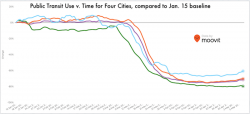While I should stress I'm not endorsing the Swedish strategy I have to think taking a short term view on the success or otherwise of their approach is flawed. Given the whole point of a herd immunity strategy is for people to get it and hence build up immunity, basing criticism on them based on the number of people getting it seems to miss the point.
My personal opposition to the strategy is that its an enormous risk on people's lives with no guarantee that it works. The proof of the pudding is probably going to take another couple of months or more to play out but I have to say that looking at their graphs I think its too early to say it hasn't worked and in fact there are some indications it might work. That is number of new cases and deaths have both peaked and seem to be on the way down, and if herd immunity does work (which is still an if) there is unlikely to be a second wave, or at least the impact of this second wave is likely to be less.
Sweden is an interesting case study.
Though on their data, it has a lot of saw toothing going on and that makes me wonder if some of the reporting is not daily.
Deaths and cases are still on the increase. Cases will need to keep climbing if they want to reach herd immunity as they need say 60-80 % to have had CV19 and so far only say 20-30% have been infected.
They have not gone full on "herd immunity" as
they have also been most aware they they did not want to overwhelm their hospitals. Their aim, officials
have said, is to slow the pace of the virus, so as not to overwhelm the health care system. But yes herd immunity is also the goal.
They do have some CV 19 controls in place. In addition some of their citizens are practising measures stricter than what their government recommends.
One large mistake they have made though, and they have acknowledged this, is to not adequately protect their aged and those in nursing homes where the death rate has been high.
There are some unknowns (as there are with any approach):
- It is not yet known if having caught CV19 will make one immune.
- While it certainly may, if CV 19 mutates , then that immunity may not be reached
- If it does make one immune, it may only be for months, or less than a year. If so it makes herd immunity unobtainable (unless a vaccine is developed to boost it)
- The % to reach herd immunity is a guess
Hanage also dismisses the idea that Sweden could reach “herd immunity” anytime soon. The expectation is that about 60% of the population will need to be infected to achieve any kind of herd immunity, he says. And no one knows how long immunity to the virus that causes COVID-19 will last once someone is infected. If it lasts less than a year, for example, like its relative the common cold, then someone could be reinfected a year from now -- and even if they don’t fall very ill, they could still pass on the virus.
COVID-19 is a new type of coronavirus that causes mild to severe cases. Here’s a quick guide on how to spot symptoms, risk factors, prevent spread of the disease, and find out what to do if you think you have it.

www.webmd.com
On the plus side their economy is less affected. The negative side is all the deaths, and many more yet deaths will still occur. One question is whether they are just advancing the deaths, but equally how many are keen to sacrifice an extra year r three of life?























